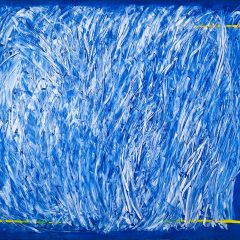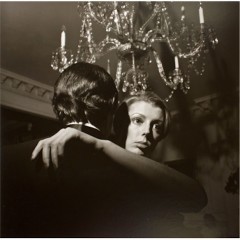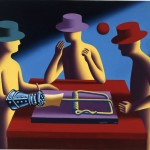Post by Corey Armpriester
With art, cigarettes and sex on my mind, I sit down with Philadelphia’s very own agent provocateur, photographer Tony Ward, for a little talk, revealing a man with drive and ambitions fueled by art and costing him his marriage. Art as home wrecker–I’m sure spouses of artists can understand such a thing.
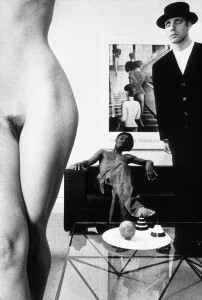
The Philadelphia photographer’s work runs the gamut from high art to low, from gallery to Bob Guccione and Penthouse Magazine. Sitting across the table from Tony Ward, I get the impression he has the confidence of a man whose ancestors follow him around everywhere he goes, except during moments of silence, his eyes share a melancholy and introspection he tightly controls; I suspect this recipe is a powerful source of seduction (the emotional tease).
If you’re an artist and have ever fantasized about traveling and exhibiting your work in galleries around the world, selling your art for thousands of dollars and having it in international museum collections while working on your fifth book in-between working on a constant stream of magazine spreads, then Tony Ward is living out your dreams in his life. How did that happen? What does it take to get that far? He talks about art patronage, feminism, space cakes, Thandie Newton and agents re-emerging to assist him in making the right introductions. He gives both the carnage and inspiration of art life, yearning for itself.
Ward will be showing some of his work at Penn, at the Fox Gallery, Feb. 17 to March 5.
Corey Armpriester-Germany has been very good to you, what is your relationship to the German people?
Tony Ward-It’s so true that Germany was a spring board for me. What happened was my agent in New York was Henrietta Brackman; she came out of retirement to help me. Henrietta introduced me to Ursula Kreis who introduced me to the right people at the right time, which resulted in my having shows in Hamburg, Berlin and other German cities.
CA-Are you surprised that your photograph titled “The Figure” sold for $18,000?
TW-I wasn’t really that surprised, only because I think it’s one of my best works; a gallery in Paris decided to invest in a print that warrants that kind of price, and a collector I met at the opening bought the piece.
The patron
CA-How important was Bob Guccione to your career? (Guccione is founder and once publisher of Penthouse magazine).
TW-Bob Guccione was pivotal because during 1995, I was producing a lot of free work, work for myself, and I was getting in a very creative zone. A friend of mine that had worked along side of Bob in the ’80s suggested I send Bob some work. I sent a portfolio to his house on 16 East 67th Street; after he saw those prints he decided to feature me in the September 1996 Anniversary Issue, 16 pages that launched my career in the adult industry. He was my patron of the arts for almost 10 years; I had an open checkbook to produce as much material as he could publish for many years. That’s what enabled me to travel to Europe so much.
CA-Do you think the grain in your photographs distinguishes your work from pornography?
TW-There’s certainly artifice built into the structure of my work to try to avoid the stigma of being labeled a pornographer, because the facts are that I was engaged in these kinds of shoots really looking for a means to express the art of it not the sex of it.
CA-Do you think the grain gets in the way of using the images as a masturbatory aid?
TW-I never considered my images to be masturbatory at all. In fact someone came up to me and said, “Tony I find your images masturbatory”; I was almost insulted or repulsed, that was the consequence of some of the work.
CA-Why is the strap-on so important?
TW-That was just a visual tool we used; it was one of the protocols.
CA-Using one word, describe the vagina.
TW-Flower
CA-Is branding your name a dehumanizing act?
TW-No, I think branding a name is important for survival. It’s a business decision that most artists make at some point of their career. At the end of the day art is a form of branding. I’m encouraging young artist to be more self-sufficient and brand them selves via the internet.
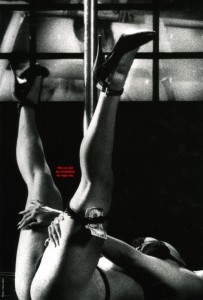
CA-Can an artist be successful without an agent or gallery representation?
TW-That’s a problem with art over the past 10 to 20 years. The galleries and the collectors became the power brokers in the art world instead of the artists and the artist almost became secondary to the art. You don’t need a big name gallery a big name museum or a big name collector verifying your importance; that is something you have to establish yourself and that is what will draw your audience, not the other way around.
CA-Why do you live in Philadelphia?
TW-This is where I was born and raised and I have family here and I’m a family oriented person. This is where my home is.
Family, assistants
CA-Do you think having a family hinders the artist in any way as far as resources and time that can be given to the work?
TW-No question, that was one of the hard things about my marriage and raising a family. It’s always an underlining drive that the work comes first. Any artist of merit will say the art comes first.
CA-How does your family deal with that and what is the consequence?
TW-The consequence in my case is divorce. Unfortunately my 23 years of marriage to my wife Sandy has started to unravel through divorce proceedings. It’s an unfortunate circumstance.
CA-Do you ever allow the assistant to take the photograph?
TW-No, my assistants generally take care of my post production needs and they also help me on the actual shoot, but I never give them the responsibility of taking the shot and then me putting my name to it; that would never happen.
CA-Is there something unethical about that?
TW-No, Andy Warhol had the factory; it’s really up to the individual artist to decide.
CA-Do you practice sex magic?
TW-I’m not gonna get into my personal sex life.
CA-What? Tony Ward is afraid to talk about sex!?
TW-I’m not afraid to talk about sex. I think there’s a thing called love and I think there’s a thing called sex and the two aren’t necessarily the same; does that answer your question?
CA-Yes.
CA-Is the Muse necessary?
TW-The Muse is like having coffee in the morning.
CA-Is feminism contributing to the destruction of the family?
TW-No, I don’t think feminism is the thing that destroys families, a lack of a long term commitment.
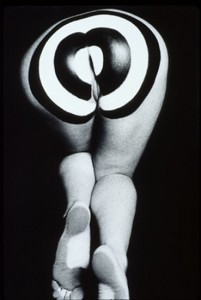
CA-People will be surprised that Tony Ward is coming to the defense of feminism; that’s very bizarre.
TW-I’m not committed to the idea of feminism. Who am I to say a feminist viewpoint is right or wrong. What I prefer to do is through my work ask more questions.
CA-Is photography stupid?
TW-Photography is simple, not stupid; even with all the cameras out there people still take very mundane pictures that don’t need to proliferate the planet. In the proper hands, it’s really a rewarding medium.
CA-Could you talk about light?
TW-There’s no such thing as good light or bad light
CA-Artificial and natural light are equal?
TW-There’s no mandate from the art gods indicating what type of light one should work with.
CA-Amsterdam is
TW-My second home.
CA-Do you have a favorite coffee shop and do you eat Space Cakes?
TW-No, no Space Cakes for me. I know too many Dutch friends that have carted Americans off to hospitals because of those space cakes.
CA-One Space Cake is not going to send you to the hospital.
TW-I know that Mick Jagger and Prince have been taken home on occasion.
Amsterdam and Philly and computerland
CA-Amsterdam seems just right for you on many levels; think about the Tulip and two lips being the vaginal lips. Have you ever thought about doing an erotic shoot in a field of Tulips or is that redundant?
TW- It’s actually a wonderful idea, I would be very compelled by something like that, and now that you gave me the idea, you may see that picture in the near future.
CA-Do you have a favorite Philadelphia artist?
TW-Hands down George Krause, he was one of my early mentors in the ’70s and after meeting him I invited him to Rochester and he stayed as a guest in my home for a weekend which was unbelievable for a 24-year-old photo student. Even till this day when I look at his work, it’s still top shelf.
CA-Are you enthusiastic about art or photography?
TW-I feel enthusiastic about digital media, the internet, specifically blogs. I think that is where artists should move their work forward, by creating their own community around the work.
CA-I’ve been to your blog and it feels like an explosion of yes.
TW-I appreciate that because for the first time in several years I feel like my creativity has been invigorated. Whenever you go through personal struggles like a divorce or illness or death in the family, it’s very draining on the creative process. I’ve catapulted all of my energies into a daily commitment. I encourage any artist young or old, if you don’t have a blog or a website or email address to get those things so you can become part of the digital world.
CA-Is there any way of escaping that?
TW-No, it’s like if you need glasses. It’s part of the process now.
CA- You see it as an empowering tool?
TW-Absolutely, you become your own publisher.
CA-Empowerment through electronic media?
TW-One hundred percent. I’ll take it a step further; I think galleries as a vehicle to show work are passé.
CA-Really!
TW-Yes, the frontier for showing uninhibited work is on the internet.
CA-How do you balance reaching for the stars and accepting reality as it exist?
TW-There is no balance. The artist must have an unwavering commitment to what they believe in and must maintain this unique position.
CA-Do you mentor artists?
TW- I’m constantly mentoring artists.
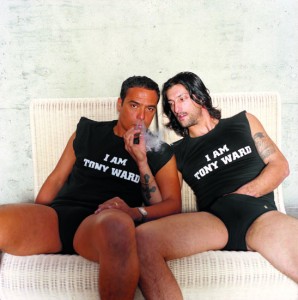
CA-What is it about human sexuality that makes you seek it out and explore it? What happen in your childhood?
TW-It’s what happened when I studied art history. I saw a lot of great things–I saw great painting and great ancient art, great sculpture, and then I started to see a lot of photography and when I look at all of that work I said, You know, what’s lacking in this great canon of art that I studied? Where’s the human sexuality? That was lacking in my view of art history
CA-Do you think it was cleverly disguised?
TW-It was disguised in allegory paintings but hard core sexuality, which is part of human existence, was never seriously addressed.
CA-Does the name Pindar mean anything to you?
TW-No, I don’t know Pindar. What is it?
CA- You have a photograph on your website that is a portrait of you and Tony Ward (model/actor/artist) you’re both wearing sexy short shorts and slogan t-shirts that say “I am Tony Ward” (I am=God, esoteric symbol) and Tony Ward (model) is feeding you something that looks like a cigarette and you’re blowing smoke out of your nose while the other Tony Ward is touching his penis. This trinity of symbols made me think of Pindar, the golden penis of the dragon/lizard that lives in the South of France. Are you familiar with this myth and legend?
TW-It’s interesting you bring up mythology and the esoteric; I have heard these kinds of connections to my work before. People may not know but I meditate twice a day. Who knows, maybe just a subliminal thing? On a practical side, the way that t-shirt came about was Helmut Newton’s former stylist Sascha Lilic saw my book Orgasm. He was creative director of Spoon magazine at the time and sent a message to his editor to contact me about us working together and I thought he was looking for Tony Ward the model. So I rang Sascha up and suggested we do a shoot with Tony Ward. Tony Ward shoots Tony Ward (the model) and Sascha loved it. We went to LA for the shoot and that’s really how that photograph came about.
CA-You seem to be more and more involved in the world of celebrity. Is there anything about that world that frightens you?
TW-The more famous you are the less autonomy you have.
CA-Would you like to say anything to Thandie Newton?
TW-I have fond memories of Thandie Newton. I’ll never forget we were shooting at Hotel 17 (New York City for Vibe magazine) and through her PR person, it was expressed that her boyfriend be able to observe me work with her and I have a mandate with all of my subjects that when I’m working with a subject it’s me and the subject unfiltered and that’s the point I’m making. When I think of Thandie Newton I think of so many people that have come after her that were not as famous with baggage–a boyfriend or a husband or an issue.
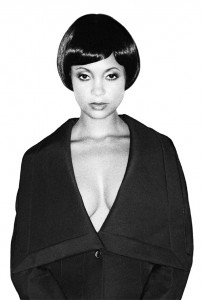
CA-Or an art director.
TW-Or an art director who some how wants to put a little influence on what I’m going to create that day and that is really a testament to my ability to say no, that I actually turned down Thandie Newton’s boyfriend to come to the shoot. I still like the pictures and still show them.
Ethics
CA-Have you ever done anything illegal to sustain, promote or create you’re art?
TW-This is something I have often referred to in interviews and I’ll say it again. In my position in America nothing can be produced unless it’s under the letter of the law. I know the law as far as adult imagery goes. The law is the law.
CA-What do you say to the student that is stealing from the photo supply store in order to make a way?
TW-I can only say to them that’s not the way to go about it.
CA-That is so conservative and diplomatic of Tony Ward to say.
TW-You have to be practical. At the end of the day we want to continue to produce work. If you’re in jail you don’t even have a cell phone, let alone a pencil to stab yourself. We have to protect our ability to produce the work at all cost.
CA-Do you come from a royal bloodline?
TW-I don’t really know; I never checked my bloodlines. My father as you may know was African American; my dad grew up pretty hard and never talked about his childhood. When he moved north, he left the South behind.
CA-What does your mom think of you’re erotica work?
TW-My mom is very traditional in that regard; she doesn’t grasp why I put so much emphasis on the erotic work and I talk to her about it, what was it about my childhood, and she comes up empty. Maybe it was the way I was raised coming from a bi-racial family made me more open to life itself and more susceptible to trying to communicate with the world about issues that were frankly hard to deal with, the issue of race and multi-racial families, brought forward by a president that comes from the same kind of mix that I have. Things have kind of worked out, my voice, my background, my reason is part of our own President’s and that is something to be proud of.
CA- Thank you Tony.
TW-It was my pleasure.
–Corey Armpriester is a Philadelphia artist. He can be contacted directly at armpriester@comcast.net


